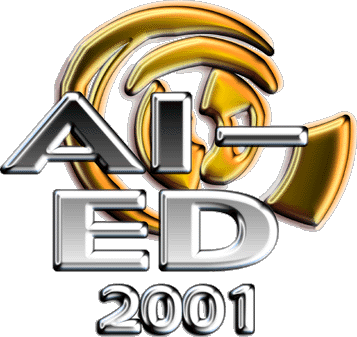
Workshop on Tutorial Dialogue Systems
Sunday, May 20, 2001
San Antonio, TX
To be held during AI-ED
2001,
the 10th International Conference on Artificial Intelligence in Education.
General Topic
Special Focus
Intended Audience
Workshop Format
Outcome
Organizing Committee
Program
Last updated: 5/14/2001
GENERAL TOPIC
Human one-on-one tutoring is the most effective form of instruction. Although
the best intelligent tutoring systems have been shown to be more effective
than classroom instruction, they are only half as effective as human tutors.
Much of the success of human tutors seems to hinge on their ability to
engage students in dialogue. It is therefore an interesting and promising
hypothesis that intelligent tutoring systems will be more effective if
they engage students in dialogue or support effective dialogue between
learners. This raises a number of broad research questions:
-
what is good tutorial dialogue?
-
why is it effective?
-
what kind of architectures can support good tutorial dialogue?
The workshop will deal with all issues related to these broad questions,
including (but not limited to) empirical studies of tutorial discourse,
the use of natural language understanding and generation technologies,
the representation of pedagogical strategies and knowledge, the use of
dialogue and text planning, and studies of the effectiveness of tutorial
dialogue systems.
Although the field of AI & Education has a long-standing interest
in these questions, they are more in the foreground now than before, due
to advances in technologies such as natural language processing, knowledge
representation, virtual reality, and multi-modal interfaces. The recent
AAAI Fall Symposium on the topic of tutorial dialog systems reflects the
surge of interest in both the AI & Education and computational linguistics
communities.
SPECIAL FOCUS: UNDERSTANDING THE TRADE-OFFS BETWEEN ARCHITECTURAL COMPLEXITY
AND PEDAGOGICAL EFFECTIVENESS
The workshop will focus on understanding the trade-offs between the complexity
of a tutorial dialogue system and its pedagogical effectiveness. Tutorial
dialogue systems tend to be complex. They contain not just the components
found traditionally in intelligent tutoring systems, but many other components
as well, such as a parser, semantic analyzer, dialogue planner, text planner,
natural language realization component, and a virtual reality module. In
the face of this complexity, it is good to ask, where is the biggest bang
for the buck? What level of architectural complexity gives the greatest
pedagogical pay-off? Is adding complexity always a good thing? What minimum
level of complexity is required? Complexity can be measured, among other
ways, in terms of development effort or the elaborateness of the architecture.
Effectiveness on the other hand can be measured as the range of dialogue
phenomena that the system supports, the generality of the approach, the
ease of maintenance, or, ultimately, the students' learning gains.
It may well be that the trade-offs differ depending on the application
domain, the overall pedagogical approach of the system, and the purpose
for which it uses natural language processing. Nonetheless, it is likely
that some common trade-offs, and ways of dealing with them, can be found
that hold across domains.
INTENDED AUDIENCE
The intended audience for this workshop are, in the first place, researchers
working on the development of educational systems that support dialog.
Researchers working on issues related to the analysis or modeling of tutorial
dialogue may also find this workshop of interest.
WORKSHOP FORMAT
The workshop will consist of paper presentations, discussion sessions,
and possibly a demo session.
The workshop will be organized thematically. Approximately three themes
will be selected based on the paper submissions. Possible themes include
(but are not limited to):
-
natural language understanding v. generation,
-
statistical v. knowledge-based approaches to natural language understanding
and generation,
-
reactive planning v. finite state machines,
-
use of AI planning algorithms v. production system approaches to dialog
management,
-
multi-level dialogue management and planning v. a single level,
-
separate tutorial and domain planning/reasoning v. integrated, and
-
domain-dependent v. domain-independent tutorial strategies.
There will be one session per theme, led by a person knowledgeable in that
area. During each session, there will be a small number of paper presentations
followed by a discussion and a brief wrap-up by the session leader. The
discussion will focus on comparing and contrasting the approaches and on
exploring whether and when certain positions along the various tradeoffs
are more promising than others.
The presenters will be asked to relate their papers to the session theme
as part of their presentation. Further, presenters will be asked to study
the other papers in their session, so that during their presentation, they
can compare and contrast their approach to others, as a way to kick off
the discussion. We plan to make available the accepted papers to all workshop
participants beforehand in order to ensure an informed discussion.
OUTCOME
All accepted papers and abstracts will be made available on the workshop
web site.
FOR FURTHER INFORMATION
For any inquiries related to this workshop, please contact Vincent Aleven
(aleven@cs.cmu.edu).
ORGANIZING COMMITTEE
Vincent Aleven
Human Computer-Interaction Institute
Carnegie Mellon University
aleven@cs.cmu.edu
Mark Core
Human Communication Research Centre
University of Edinburgh
markc@cogsci.ed.ac.uk
Jerome Lehuen
Equipe Langue et Dialogue
Laboratoire d'Informatique
Universite du Maine
Jerome.Lehuen@lium.univ-lemans.fr
Rachel Pilkington
Computer Based Learning Unit,
The University of Leeds,
R.M.Pilkington@cbl.leeds.ac.uk
Carolyn Penstein Rose
Learning Research and Development Center
University of Pittsburgh
rosecp+@pitt.edu
Florence M. Reeder
George Mason University /
The MITRE Corporation
freeder@mitre.org
Jeff Rickel
USC Information Sciences Institute
rickel@ISI.EDU
Peter Wiemer-Hastings
Human Communications Research Centre
University of Edinburgh
peterwh@cogsci.ed.ac.uk
Beverly Park Woolf
Department of Computer Science
University of Massachusetts
bev@cs.umass.edu

